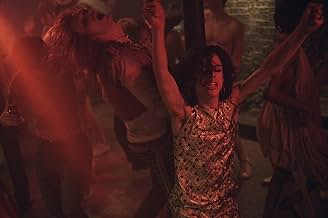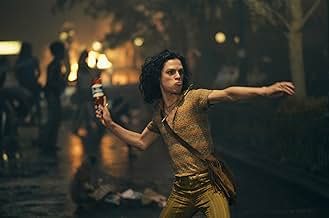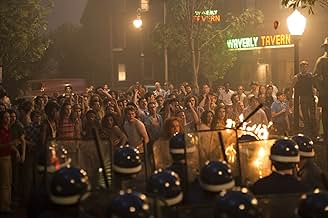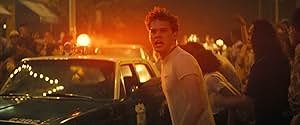NOTE IMDb
5,4/10
4,6 k
MA NOTE
L'éveil politique d'un jeune homme et son passage à l'âge adulte au cours des jours et des semaines qui ont précédé les émeutes de Stonewall.L'éveil politique d'un jeune homme et son passage à l'âge adulte au cours des jours et des semaines qui ont précédé les émeutes de Stonewall.L'éveil politique d'un jeune homme et son passage à l'âge adulte au cours des jours et des semaines qui ont précédé les émeutes de Stonewall.
- Réalisation
- Scénario
- Casting principal
- Récompenses
- 4 nominations au total
Vlad Alexis
- Cong
- (as Vladimir Alexis)
Avis à la une
I was not previously aware of the negative reviews of this film. And that is a good thing, since they might have deterred me from watching. Having now seen the film, and having done so as A) someone who is old enough to remember firsthand what it was like to be gay in middle America in 1969 (far worse than what is depicted in this film!), B) someone who was disowned and thrown out by his parents at age 17 for being gay, C) a long-time gay activist, and D) a professional historian, all I can say is that the critics need to get past the fact that this is *not* a dispassionate, objective documentary about the Stonewall Riots. Rather, it is a fictionalized evocation of the social, cultural, and political circumstances that eventually triggered the riots. And in that regard, I think the film did an outstanding job. Those born after about 1970 largely have no reason to remember bar raids, police payoffs, anti-cross-dressing laws, or even the overt involvement of organized crime in the operation of many gay bars. And that is in large part thanks to the bravery of the "deplorables" (to use a word circulating in this election cycle) who finally said, "Enough is enough." From my perspective as an elderly gay man who continues to be utterly dumbfounded (and delighted!) by the social changes that gay militants have achieved over the past half-century, I can only say "Thank you" to the makers of this film for at least trying to tell the story in a passionate, subjective manner. If you want cold, emotionless history, tune in to the National Geographical Channel. If you want some sense of what it *felt like* in 1969 (and for many years thereafter), see this film. Is the film "flawless"? No. But despite a few flaws, it is an excellent film.
Government action against homosexuals leads to the 1969 Stonewall Riots in NYC. Danny Winters is a runaway from Indiana. He is befriended by Ray and his group of gay friends. They struggle to find a place in the world.
Everybody is played over the top including the flat doe-eyed Danny. There is only so many Danny jaw drops that I can take. It's overwrought at almost every point. I want to say it's unflinching but it's more like pulp fiction. There are hints of artificiality which are the flat notes of this historical drama. The struggles of the fictional Danny Winters in his home town could be a compelling story by itself. Roland Emmerich's insistence of tying it to the Stonewall Riots is questionable. It's like saying the history cannot be comprehended without a white middle America protagonist. Ray is a more compelling character. The plot is also overstuffed which sidetracks the story and drags the pacing. This is problematic especially considering the needs of this important history.
Everybody is played over the top including the flat doe-eyed Danny. There is only so many Danny jaw drops that I can take. It's overwrought at almost every point. I want to say it's unflinching but it's more like pulp fiction. There are hints of artificiality which are the flat notes of this historical drama. The struggles of the fictional Danny Winters in his home town could be a compelling story by itself. Roland Emmerich's insistence of tying it to the Stonewall Riots is questionable. It's like saying the history cannot be comprehended without a white middle America protagonist. Ray is a more compelling character. The plot is also overstuffed which sidetracks the story and drags the pacing. This is problematic especially considering the needs of this important history.
There's so much wrong with this movie it's hard to know where to begin.
If you want to learn about Stonewall, there are plenty of documentaries out there that tell the story much more accurately than this does: this flick plays into the tired old cliches about how the riot started, but manages to whitewash the characters and distort events horribly. You'd be better off watching "The Death and Life of Marsha P. Johnson" for starters.
If you just want a well-acted, well-written period drama, there are countless other films with better acting, better character development and less cliched writing than this one. What's particularly offensive is the reliance once again on stereotypical caricatures of fat, ugly old lecherous queens, preying upon the purebred white-boy central character. Other characters (Ray being the prime example) are completely undeveloped and could have made things more interesting. And lastly, you'd be offended if you watch this after seeing the 1995 "Stonewall" to see how much Roland Emmerich simply rips off from THAT film.
Joey King as the little sister provides some momentary relief...but like a lot of missed opportunities, there's not nearly enough of her, either.
As an old-car lover, the frequent presence of 1966 Plymouths and other gorgeous 60s cars was one of the few things that saved this from being a complete disaster.
If you want to learn about Stonewall, there are plenty of documentaries out there that tell the story much more accurately than this does: this flick plays into the tired old cliches about how the riot started, but manages to whitewash the characters and distort events horribly. You'd be better off watching "The Death and Life of Marsha P. Johnson" for starters.
If you just want a well-acted, well-written period drama, there are countless other films with better acting, better character development and less cliched writing than this one. What's particularly offensive is the reliance once again on stereotypical caricatures of fat, ugly old lecherous queens, preying upon the purebred white-boy central character. Other characters (Ray being the prime example) are completely undeveloped and could have made things more interesting. And lastly, you'd be offended if you watch this after seeing the 1995 "Stonewall" to see how much Roland Emmerich simply rips off from THAT film.
Joey King as the little sister provides some momentary relief...but like a lot of missed opportunities, there's not nearly enough of her, either.
As an old-car lover, the frequent presence of 1966 Plymouths and other gorgeous 60s cars was one of the few things that saved this from being a complete disaster.
Gay themed films are n abundance right now and (lesbian couples, transgender stories, more gay characters in many films) so it seems only natural that yet another film be made about the beginning of gay rights in the US. STONEWALL does that and despite the emphasis on political corruption attempting to steal the thunder from the brave gays who initiated the change to Gay Pride it works for the most part.
Many viewers will avoid the film because of the depiction of gays as being homeless, feminine street hustlers – too much so that it becomes a distraction form the other aspects of the story – but at least the message and the dates and the history are there. The plot revolves around the 1969 Stonewall Riots, the violent clash that kicked off the gay rights movement in New York City. The drama centers on Danny Winters (Jeremy Irvine), who flees to New York after an aborted coming out with Joe (Karl Glusman) and being ousted by his homophobic father (David Cubitt), leaving behind his sister Phoebe (Joey King). He finds his way to the Stonewall Inn, where he meets Trevor (Jonathan Rhys Meyers) before catching the eye of Ed Murphy (Ron Perlman), manager of the Stonewall who colludes with corrupt police and exploits homeless youth. Danny becomes close to a group of Nellie hustlers – especially Ray (Jonny Beauchamp) – and it is his association with this gay element that he eventually joins and fights for gay rights.
The cast is strong, the script by Jon Robin Baitz is less than impressive, but director Roland Emmerich manages to make the blend of history and human tragedy credible. Not a great movie, but the intentions are worthy.
Many viewers will avoid the film because of the depiction of gays as being homeless, feminine street hustlers – too much so that it becomes a distraction form the other aspects of the story – but at least the message and the dates and the history are there. The plot revolves around the 1969 Stonewall Riots, the violent clash that kicked off the gay rights movement in New York City. The drama centers on Danny Winters (Jeremy Irvine), who flees to New York after an aborted coming out with Joe (Karl Glusman) and being ousted by his homophobic father (David Cubitt), leaving behind his sister Phoebe (Joey King). He finds his way to the Stonewall Inn, where he meets Trevor (Jonathan Rhys Meyers) before catching the eye of Ed Murphy (Ron Perlman), manager of the Stonewall who colludes with corrupt police and exploits homeless youth. Danny becomes close to a group of Nellie hustlers – especially Ray (Jonny Beauchamp) – and it is his association with this gay element that he eventually joins and fights for gay rights.
The cast is strong, the script by Jon Robin Baitz is less than impressive, but director Roland Emmerich manages to make the blend of history and human tragedy credible. Not a great movie, but the intentions are worthy.
The film is derivative, as well as whitewashed.
There are so many factual goofs, when it comes to clothes, music, etc. The filmmaker needed to spend some time doing research and fact checking.
I also find fault with the film centering around a kid from Kansas. The uprising was started by Puerto Rican and African American drag queens, and there is strong support that the first police resistance was by a lesbian, not some white football player from the mid-west.
I suggest watching the British 1997 film, which really feels so much more authentic.
There are so many factual goofs, when it comes to clothes, music, etc. The filmmaker needed to spend some time doing research and fact checking.
I also find fault with the film centering around a kid from Kansas. The uprising was started by Puerto Rican and African American drag queens, and there is strong support that the first police resistance was by a lesbian, not some white football player from the mid-west.
I suggest watching the British 1997 film, which really feels so much more authentic.
Le saviez-vous
- AnecdotesThe Stonewall Inn or sometimes referred as Bonnie's Stonewall Inn was originally built as stables in the mid 19th century. By 1930 it became a Tearoom for heterosexuals. The Stonewall Inn first closed in 1964 after 34 year's of business as a Tearoom when the interior was destroyed by fire. It was restored by three mobsters in 1967 as a gay bathhouse and became the largest gay bar in the US. After the riots in 1969 it shortly closed. For twenty years the Stonewall ran as a Bagel Sandwich Shop, a Chinese Restaurant and shoe store before reopening in 1998 as simply Stonewall.
- GaffesThe timing of Danny's arrival in New York is confused. He leaves Indiana during the fall (it's football season, and the World Series is about to start). But his bus arrives in New York in March (3 months before the Stonewall riots).
- ConnexionsFeatured in Identités trans: Au-delà de l'image (2020)
- Bandes originalesI Say A Little Prayer
Written by Hal David & Burt Bacharach
Performed by Stingray Music
Courtesy of Stingray Music c/o Covered Records, Inc.
Meilleurs choix
Connectez-vous pour évaluer et suivre la liste de favoris afin de recevoir des recommandations personnalisées
- How long is Stonewall?Alimenté par Alexa
Détails
- Date de sortie
- Pays d’origine
- Sites officiels
- Langue
- Aussi connu sous le nom de
- 石牆風暴
- Lieux de tournage
- Montréal, Québec, Canada(as New York City)
- Société de production
- Voir plus de crédits d'entreprise sur IMDbPro
Box-office
- Budget
- 13 500 000 $US (estimé)
- Montant brut aux États-Unis et au Canada
- 187 674 $US
- Week-end de sortie aux États-Unis et au Canada
- 112 834 $US
- 27 sept. 2015
- Montant brut mondial
- 292 669 $US
- Durée2 heures 9 minutes
- Couleur
- Mixage
- Rapport de forme
- 2.35 : 1
Contribuer à cette page
Suggérer une modification ou ajouter du contenu manquant












































